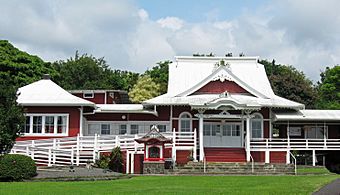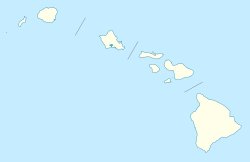Daifukuji Soto Zen Mission facts for kids
Quick facts for kids |
|
|
Daifukuji Soto Zen Mission
|
|
 |
|
| Location | Mamalahoa Highway, Honalo, Hawaii |
|---|---|
| Area | less than one acre |
| Built | 1921 |
| Architect | Yoshisuke Sasaki |
| NRHP reference No. | 94000382 |
| Added to NRHP | April 21, 1994 |
The Daifukuji Sōtō Mission is a special Zen Buddhist temple located on the beautiful Big Island of Hawaiʻi. It was built a long time ago, in 1914, and has a rich history. This temple is a peaceful place where people can learn about Zen Buddhism.
Contents
The Temple's Story: A Journey of Faith
How the Temple Began
In 1914, a special leader named Reverend Kaiseki Kodama came to the Kona area. He started holding services in a local store. He really wanted to build a proper temple. To do this, he walked all around the entire island. He was collecting donations from people to help make his dream come true.
In 1915, the very first temple was built. It was a small building with a thatched roof. This first temple was named Hakuhozan Daifukuji. This means "Temple of Great Happiness on White Mountain Peak." Important Zen leaders in Japan gave it this name. The temple is located in Honalo, Hawaii, on the slopes of Mauna Loa. Even though "white mountain" often refers to Mauna Kea, Mauna Loa also gets snow in winter.
Building the Main Temple
Reverend Kaiseki Kodama returned in 1918. He started building the current temple in 1920. On May 27, 1921, a special ceremony was held. A beautiful Buddha image was placed in the main hall. The temple's design mixes traditional Japanese styles with local Hawaiian building methods.
A first-generation immigrant named Yoshisuke Sasaki designed the temple. He owned a store nearby in Keauhou, Hawaii. The main carpenter, Teruyoshi Ikenouchi, led the construction. Over the next few years, more buildings were added. In 1926, a Japanese language school was opened. This happened under the third minister, Giko Kanbara, and his wife, Shigeko Kanbara.
Important Times and Changes
During World War II, the temple faced a difficult time. In 1941, it had to close. The minister, Reverend Hozui Nakayama, was sent away. The United States Army used the temple site for a while. However, local community members were still allowed to hold funeral services there.
After the war ended, the temple reopened in February 1946. Around 1950, a house for the minister was added. On May 25, 1961, a small shrine was built on the steps leading to the temple. It has a statue of Jizō, a special figure in Buddhism.
Recognizing Its Importance
The Daifukuji Sōtō Mission is a very important historical site. It was added to the state of Hawaii registry of historic places on March 9, 1991. Later, on April 21, 1994, it was added to the National Register of Historic Places listings on the island of Hawaii. This means it's recognized as a special place across the country.
Temple Features and Art
The Temple's Design
The temple's roof has a traditional Japanese style. It's called Irimoya, which is a decorated gable roof. Inside the main hall, you can find an image of the historical Gautama Buddha. On the right side, there is a seated figure of Dōgen. On the left, you'll see Keizan. These two figures are important founders of the Sōtō Zen tradition.
Sacred Figures and Statues
An alcove to the right of the main altar holds two more figures. One is Bodai Daruma Daishi, also known as Bodhidharma. He brought Buddhist teachings from India to China. The other figure is Daigen Shuri Bosatsu, another bodhisattva. A bodhisattva is someone who chooses to delay their own enlightenment to help others.
The Kannon Hall was added in 1937. It has a beautiful image of Kannon (Guan Yin). Kannon is known as the bodhisattva of great compassion. Sosaku Miki sculpted this image. Around her, there are 33 smaller Kannon statuettes. These represent the many different ways compassion can be shown.
Other Areas of the Temple
Uphill from the temple, there is a small cemetery. Even though the inside of the temple has been updated over time, many original pieces remain. These include sculptures, one from 1915, and the beautiful acacia koa wood altar.
Community and Location
The Daifukuji Sōtō Mission became a very important place for Japanese immigrant families in the Kona area during the 20th century. It was a center for their community.
A store built near the mission in 1929 by the Teshima family later became a restaurant in the 1940s. This restaurant is still well-known. The temple is located at 79-7241 Mamalahoa Highway (state route 11). This area is part of the Kona Heritage Corridor, a place with lots of history.
Images for kids
 | Roy Wilkins |
 | John Lewis |
 | Linda Carol Brown |



